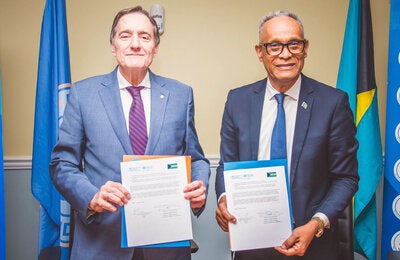

A number of countries in the Americas have launched efforts to reduce salt consumption in their populations, and experts say that expanding these efforts to other countries could save tens of thousands of lives over the next decade.
Health authorities are asking food makers to cut sodium in products ranging from instant noodles to bread
Washington, D.C., 2 November 2011 (PAHO/WHO) — A number of countries in the Americas have launched efforts to reduce salt consumption in their populations, and experts say that expanding these efforts to other countries could save tens of thousands of lives over the next decade.
Health officials in Argentina, Brazil, Canada, Chile, Costa Rica, Cuba, Mexico, Suriname, Uruguay, and the United States have undertaken efforts ranging from mass media and educational campaigns to collaboration with food makers to improve nutrition labels and reformulate their products to contain less salt.
Government representatives and scientific experts on salt reduction from throughout the Americas met at the Pan American Health Organization (PAHO) in Washington, D.C., last week to discuss these efforts and to urge other countries to follow suit.
"Salt reduction is one of the most cost-effective public health measures available," said Dr. Norm Campbell, professor of medicine at the University of Calgary (Canada) and chair of a PAHO-convened expert group on salt and health. "If other countries join these efforts, we can save tens of thousands of lives over the next 10 years."
Researchers in Canada have estimated that reducing sodium intake by 10 percent each year in 18 Latin American countries could prevent 593,000 cardiovascular events and save some 54,000 lives. Cost-effectiveness studies have shown that reducing salt consumption at the population level can cut the prevalence of related chronic diseases at a cost of between 4 and 32 US cents per person per year.
Although salt is essential to the human body, overconsumption can cause high blood pressure (hypertension), a major risk factor for heart attacks, strokes and kidney disease. In the Americas, from one-fifth to one-third of all adults have high blood pressure, and among people over age 80, the proportion is over 90 percent.
In most countries of the Americas, average salt consumption is significantly higher than the internationally recommended limit of less than 5 grams of salt per day. Brazilians consume 11 grams a day on average, for example, while Argentines consume 12 grams, Canadians consume 7.7 grams, and people in the United States consume 8.7 grams per person per day.
The problem is not just salt added to food during cooking or at the table. In most countries of the Americas, the largest amount of dietary salt comes from ready-made meals and prepared foods including bread, processed meats, breakfast cereals, and snack foods.
"Most people are unaware of where most of the salt they consume comes from and how damaging it can be to their health," said Dr. James Hospedales, PAHO's senior advisor on prevention and control of chronic diseases. "Raising awareness and changing behavior are important, but population-wide policies and action are key if we are going to make the healthy choice the easy choice for people to make."
In Argentina and Chile, health authorities have worked successfully with both large and small bakeries to reduce the sodium content of bread, one of the main sources of dietary salt in both countries. In Brazil, major food makers' associations have agreed to reduce the salt content in industrially produced bread and buns by 10 percent per year until 2014.
Other efforts currently under way to reduce salt consumption in the Americas include:
- Advocacy and engagement with industry to encourage the adoption of voluntary targets for reducing salt in food products including meats, soups and instant noodles, breakfast cereals, baby food, cake mixes, and snack foods.
- Mass media and educational campaigns on the importance of consuming less salt.
- Inclusion of sodium on nutritional labels and as part of national dietary recommendations.
- Inclusion of salt sessions in public health meetings and conferences.
- Monitoring of sodium content in foods and levels of consumption in the population.
- Coordination with iodine supplementation programs to prevent reduced consumption of iodine due to sodium reduction.
Persuading food makers to voluntarily adopt such recommendations has proven easier when advocates can cite similar action already undertaken in other countries. However, if such efforts fail, mandatory regulation is justified, the experts said.
"Food makers would much rather take voluntary action than face regulation," said Dr. Hospedales. "However, the possibility of regulatory changes is a strong motivator and should remain on the table."
The PAHO/WHO Regional Expert Group on Cardiovascular Disease Prevention through Dietary Salt Reduction is made up of leading experts on nutrition and chronic diseases from universities, government agencies, and research institutions in North, South, and Central America, the Caribbean, and Europe.
In the meeting last week, they reviewed evidence on the cost-effectiveness of salt reduction and discussed lessons learned from salt reduction initiatives currently under way in PAHO member countries.
A similar PAHO expert group in 2007 called for the elimination of trans fatty acids from industrially processed foods throughout the Americas (see link below).
PAHO was established in 1902 and is the world's oldest public health organization. It works with all the countries of the Americas to improve the health and quality of life of the people of the Americas and serves as the Regional Office for the Americas of the World Health Organization (WHO).
Links
- Cardiovascular Disease Prevention through Dietary Salt Reduction
- PAHO expert group policy statement
- Nutrition Experts Call on Food Industry to Support "Trans Fat Free Americas"
Contact
Donna Eberwine-Villagran, Tel. +1 202 974 3122, Mob. +1 202 316 5469 or Leticia Linn, linnl@paho.org, Tel. + 202 974 3440, Mob. +1 202 701 4005, Knowledge Management and Communication, PAHO/WHO.



